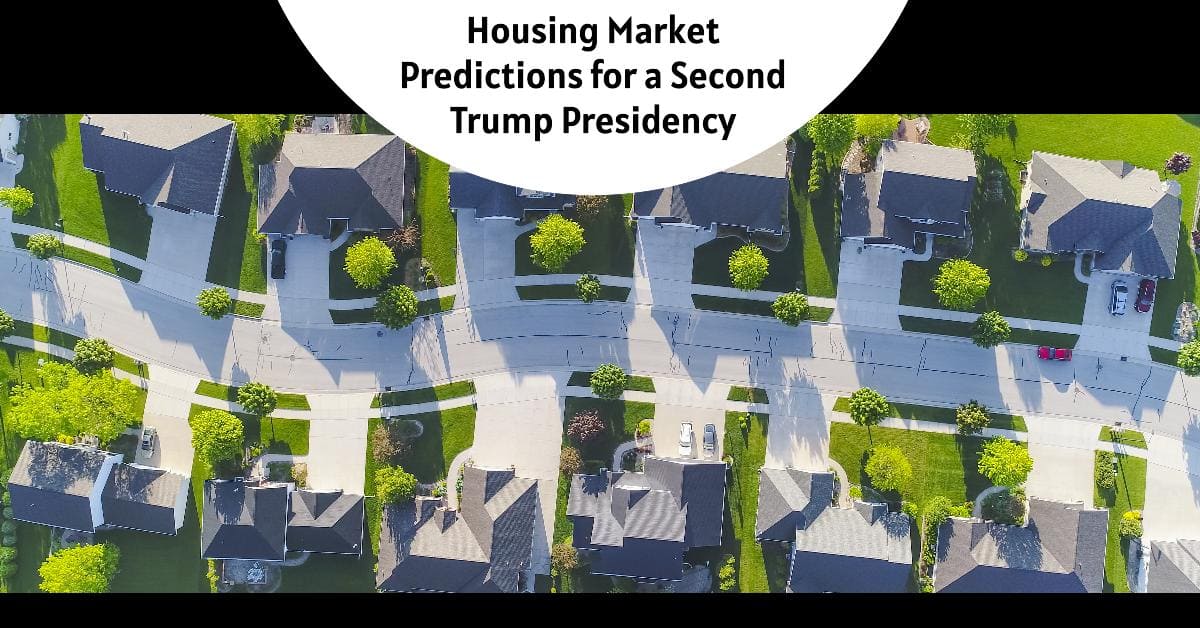Will a Trump victory reshape the 2025 housing market? As speculation swirls about the potential for a second term for Donald Trump in the 2024 presidential election, one of the most crucial sectors observing these developments is the housing market. For Millennials and the emerging Generation Z, who are on the brink of homeownership, understanding the implications of a Trump administration is vital.
Housing Market Predictions for 2025 if “Trump” Wins Election
Economic Policies and Their Impact on Housing
Trump's potential economic growth strategy may prioritize classic approaches, such as deregulation and tax cuts, aimed at stimulating the economy. These policies could lead to increased investments in housing development, ultimately boosting the supply of new homes. For potential buyers, this could initially signal a decrease in housing prices. However, if demand remains robust and outpaces supply, the long-term effect could see escalating home prices, making homeownership even more elusive for Millennials and Gen Z.
Housing Affordability: A Generation’s Challenge
One of the most pressing concerns for Millennials and Gen Z is housing affordability. Many are currently grappling with the challenge of saving for down payments due to a widening wealth gap. Changes to tax policy, especially those stemming from the Tax Cuts and Jobs Act, may significantly impact homeownership decisions. For example, any reconsideration of the cap on mortgage interest deductions could alter the financial landscape for potential buyers and influence their purchasing power.
Deregulation and Lending Practices
An element of Trump’s agenda could include further deregulation of the housing market, leading to softer lending standards. While this might reduce mortgage costs and boost demand, it poses a risk reminiscent of the lax borrowing standards that contributed to the 2008 financial crisis. Striking a balance between stimulating the market and ensuring responsible lending practices will be crucial for sustainable growth.
Recommended Read:
How the Housing Market Fared During Donald Trump’s Previous Term?
The Federal Reserve’s Influence
The Federal Reserve plays a pivotal role in determining interest rates, which directly impacts mortgage rates and housing affordability. If Trump’s policies lead to a reduction in interest rates, potential homebuyers could benefit in the short term, making homeownership more accessible. However, sustained low rates could also lead to an overheated housing market, potentially resulting in another bubble.
The Generational Divide in Homeownership
As Millennials venture further into their home buying journeys, the market dynamics present unique challenges for Generation Z. Unlike Millennials, who are experiencing historically low mortgage rates, Gen Z faces limited supply and escalating prices, complicating their entry into the housing market. This generational divide adds another layer of complexity to the future of homeownership.
Potential Future Trends
- Increased Construction: If Trump prioritizes deregulation, it may lead to an uptick in new housing projects, particularly in urban areas where supply is notably low. This could favor both generations looking for affordable housing options.
- Investment Opportunities: With tax policies potentially favoring real estate investments, Millennials and Gen Z may find new opportunities for investment in rental properties or real estate funds, diversifying their financial portfolios.
- Remote Work and Housing Preferences: As remote work becomes more entrenched, younger buyers may seek homes in suburban or rural areas where prices are lower, further influencing market trends.
- Green Housing Initiatives: Should environmental concerns become a focus under a potential Trump administration, we might see increased investment in sustainable building practices, appealing to younger generations concerned about climate change.
Preparing for Various Scenarios
With the stakes high heading into the 2024 election, the potential implications of a Trump presidency on housing cannot be overstated. For Millennials and Gen Z, staying informed and prepared for various scenarios is essential to navigate the unpredictable nature of the market. Understanding the potential effects of economic policies, interest rates, and lending practices will empower them to make informed buying decisions.
Frequently Asked Questions (FAQs)
1. How does a Trump presidency affect housing prices?
A Trump administration could influence housing prices through policies that affect economic growth and interest rates. For example, deregulation and tax cuts could stimulate housing supply initially, but if demand continues to rise, prices may increase in the long term.
2. What should first-time home buyers consider under potential Trump policies?
First-time home buyers should monitor changes in interest rates, lending standards, and any tax reforms that could affect their purchasing power. Understanding how these factors interplay will be crucial for making informed decisions.
3. Are Millennials at a disadvantage in the housing market?
Yes, Millennials face increased challenges such as rising home prices, a higher cost of living, and student loan debt that may hinder their ability to save for down payments compared to prior generations.
4. What impact could deregulation have on the housing market?
Deregulation could lower lending standards, making it easier for new buyers to obtain mortgages. However, this approach carries risks, including the possibility of creating another housing bubble if lending becomes too lenient.
5. How can Gen Z adapt to the current housing market?
Gen Z can explore alternative paths to homeownership, such as co-buying properties with friends, investing in real estate crowdfunding, or renting in areas where they can save more money to eventually purchase a home.
6. What trends should we expect in the housing market if Trump is re-elected?
If Trump is re-elected, we may see increased construction in urban and suburban areas, potential investment incentives for younger buyers, and a focus on affordable housing initiatives, depending on the administration's priorities.
Recommended Read:
- Housing Market Predictions for Next Year: Prices to Rise by 4.4%
- Housing Market Forecast for the Next 2 Years: 2024-2026
- Housing Market Predictions for Next 5 Years (2024-2028)
- Housing Market Predictions: 8 of Next 10 Years Poised for Gains
- Housing Market Predictions: Top 5 Most Priciest Markets of 2024
- Real Estate Forecast Next 5 Years: Top 5 Future Predictions
- Housing Market Predictions for 2027: Experts Differ on Forecast





